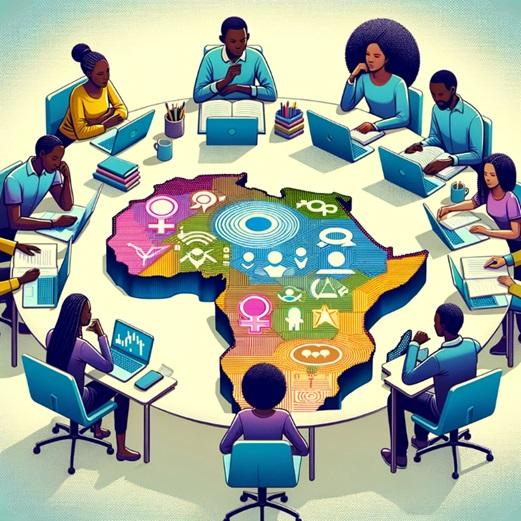Promoting the Use of Evidence in Policy at the Country Level: An Update on the KIX Africa 19 Hub
Gabriel Mekbib, Victoria Kisaakye, Maryann Joy Dreas, Yvonne Mboya, and Bezawit Demere
April 12, 2024
The authors are with the KIX Africa 19 Hub team at UNESCO IICBA.
As the second phase (2024-2027) of the Global Partnership for Education’s (GPE) Knowledge and Innovation eXchange (KIX) Africa 19 Hub project progresses, we are sharing updates on ongoing and upcoming initiatives. The Hub, established in March 2020 by the Global Partnership for Education and the International Development Research Center aims to enhance education policy through the effective use of data, knowledge, and innovation. The Hub, comprising UNICEF ESARO, the African Union, and UNESCO IICBA, serves 18 English-speaking African countries plus Mozambique in sub-Saharan Africa. From participant-led Communities of Practice to the launch of an educational animated video series, this blog provides a brief overview of the Hub's recent activities.

Community of Practice on Gender-Responsive Education
Initiated in November 2023, this Community of Practice (CoP) has enabled Ministry of Education officers and local education group stakeholders to collaborate in promoting gender equity and equality within national education systems. As shown in IICBA’s first Africa Teachers Report, girls who are educated earn higher wages, have better health outcomes (as do their children), and contribute more to the development of their societies. Yet, in many countries in sub-Saharan Africa, girls are dropping out of school, marrying early and not completing their education. The CoP serves as a platform for policy actors to exchange knowledge on gender-responsive policies and practices across the region. The program, which started with six virtual workshops in late 2023, is on-going with practical task that earn participants certificates.
The CoP meting enable countries to share their experiences. For example, at the last meeting, Mr. Petros Yoseph shared insights from Ethiopia's Ministry of Education efforts to increase the share of female school leaders. Please see resources from the CoP and view the most recent CoP webinar from March 14, 2024.
Co-planning Activities with Country Partners
On February 21, 2024, the Hub convened a virtual meeting with focal points and technical advisors to outline its strategic plans for the year. During this session, stakeholders deliberated on and proposed future KIX activities, focusing on four key areas: (i) enhancing teacher professional development; (ii) promoting gender equality, equity, and inclusion; (iii) bolstering early childhood education; and (iv) addressing the education data challenge. This proactive engagement ensures that planned activities are responsive to diverse needs across Hub country partners.
In addition to insights gained from the virtual meeting, the Hub is also using feedback from an annual pulse survey conducted among its stakeholders to guide strategic planning. The survey revealed that 81% of respondents believe the Hub has significantly improved collaboration between education stakeholders, facilitating valuable exchanges across borders. Another 19% suggest moderate but still encouraging effectiveness. Findings from the survey are highlighted in the Figure below.

Feedback has been important in shaping the Hub's agenda for 2024. Planned engagements include capacity enhancement sessions on cost-benefit analysis of special versus inclusive education, conducting peer reviews of educational management information systems (EMIS) among Hub partner countries using the African Union’s EMIS Norms and Standards, and facilitating KIX National Policy Dialogues. You can view the 2024 KIX activity timeline and on the pulse survey a simple infographic.
Three New Videos
UNICEF ESARO had produced for the KIX Africa 19 Hub Consortium three animated videos highlighting the challenges and innovations in education across Sub-Saharan Africa. These videos focus on improving educational access and outcomes for girls, addressing the needs of children with disabilities, and introducing the UNICEF ECE Accelerator Toolkit to support nations in developing evidence-based Early Childhood Education plans.

Partner Resources
Finally, the Center for Universal Education at Brookings has published accessible scaling briefs summarizing three years of comprehensive research. These briefs provide actionable insights for implementing innovative educational strategies, tailored for education professionals.

